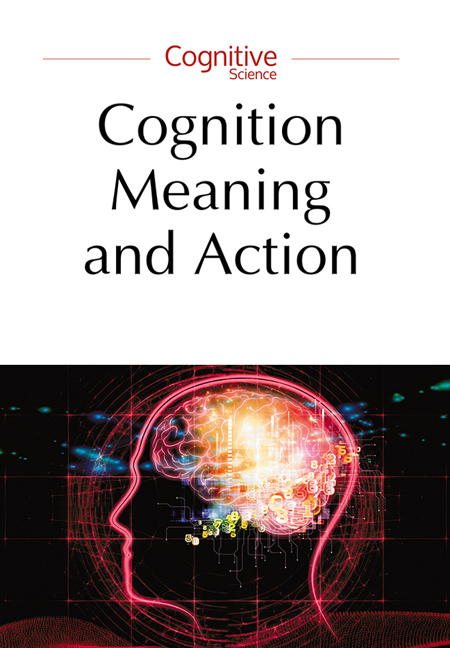Book contents
- Frontmatter
- Contents
- The crossroads of cognitive science
- Cognitive science: From computers to ant hills as models of human thought
- Two procedures expanding a linguistic competence
- Neurobiological basis for emergence of notions
- Similarity as distance: Three models for scientific conceptual knowledge
- The Approximate Numbers System and the treatment of vagueness in conceptual spaces
- Communication, cognition, and technology
- To tell and to show: The interplay of language and visualizations in communication
- Semiotics, signaling games and meaning
- Out of the box thinking
- The everyday of decision-making
- Short- and long-term social interactions from the game theoretical perspective: A cognitive approach
- Notes about Authors
The crossroads of cognitive science
Published online by Cambridge University Press: 10 January 2018
- Frontmatter
- Contents
- The crossroads of cognitive science
- Cognitive science: From computers to ant hills as models of human thought
- Two procedures expanding a linguistic competence
- Neurobiological basis for emergence of notions
- Similarity as distance: Three models for scientific conceptual knowledge
- The Approximate Numbers System and the treatment of vagueness in conceptual spaces
- Communication, cognition, and technology
- To tell and to show: The interplay of language and visualizations in communication
- Semiotics, signaling games and meaning
- Out of the box thinking
- The everyday of decision-making
- Short- and long-term social interactions from the game theoretical perspective: A cognitive approach
- Notes about Authors
Summary
The monograph Cognition, Meaning and Action. Lodz-Lund Studies in Cognitive Science collects papers written by the members of two Cognitive Science Departments: of Lund and of Lodz. It presents a range of issues currently examined in both centers. Some texts are written in collaboration as the result of collective research.
The opening article “Cognitive science: From computers to ant hills as models of human thought” (Peter Gärdenfors) offers an introduction to the history of ideas in cognitive science as it has been developing throughout last decades. Much of the contemporary mind theories derive from Descartes’ res cogitans and res extensa distinction, and to some extent they may be seen as a continuation of rationalist-empiricist debate. The dawn of computer science is kept in quite rationalist fashion. The fundamental concept of computer science is the theoretical construct of Turing's machine. Inspired by Turing's concept, John von Neumann proposes a general architecture for modern computer based on logic circuits. The transfer of these findings to a theory of how the mind works was only a matter of time. Soon after von Neumann's proposal, McCulloch and Pitts interpreted neurons as a logic circuits combining information from other neurons according to some logical operations. This leads directly to one conclusion: the entire brain is a huge computer – and so the foundational metaphor for cognitive science was born.
Cognitive science can be said to emerge in 1956, the year in which Noam Chomsky, in response to the behaviourist concept of language, presented his proposition of transformational grammar. His central argument is based on the claim that processing the grammar of natural language requires a sort of algorithm as used in Turing machine. Also in 1956 Newell and Simon demonstrated the first computer program constructing logical proofs from a given set of premises and, finally, the concept of Artificial Intelligence was used for the first time. The philosophical assumption of the AI approach to cognitive processes is that the representation of mental content and processing is essentially symbol manipulation: only logical relations connect different symbolic expressions in a mental state of a person. The meaning of symbols is not part of the process of thinking, since they are manipulated exclusively on the basis of their form.
- Type
- Chapter
- Information
- Cognition, Meaning and ActionLodz-Lund Studies in Cognitive Science, pp. 7 - 10Publisher: Jagiellonian University PressPrint publication year: 2015



